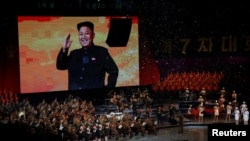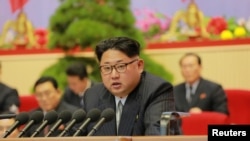This week North Korea's leader Kim Jong Un capped years of political maneuvers, purges and executions by assuming the post of party chairman, declaring it the start of the "Kim Jong Un era."
The event was widely seen as cementing his leadership role, but analysts in Washington and Seoul say that revitalizing the North's ailing economy appears to be the key to maintaining his long-term rule.
Ken Gause, Director of the International Affairs Group at the Center for Naval Analyses, said fixing the country’s economy will be major challenge.
"He has to show some sort of progress on the economy. I believe that is intimately linked to his ability to consolidate his power," said Gause, who is following the North Korean leadership closely.
Growing threat
With international sanctions increasing, mismanagement of the already crippled economy could lead to tensions in the regime, according to the North Korea expert.
Gause said the reshuffle of top officials and policy announcements at the party gathering showed Kim still needs more time to fully consolidate power.
"I would argue that this is a step toward consolidation of power. But he has still not fully consolidated his power and that’s probably going to take another year or so," he said.
Gause said Kim’s nuclear policy is a major obstacle to the country’s economic development.
"Ultimately what North Korea wants to do is to be able to engage the United States and South Korea without preconditions, which means without having the denuclearization issue standing in the way," said Gause.
Obstacle to growth
Whether Kim will choose economic prosperity over nuclear weapons remains unclear. Addressing more than 3,400 delegates at the congress, Kim vowed to maintain his declared policy of pursuing nuclear weapons and economic growth simultaneously.
Kim also announced a five-year economic plan, the first since the 1980s.
Over the next five years, the North should "fly the flag of victory" and become a "scientific and technological, economic and highly civilized power," Kim said.
He also called for efforts to improve the country’s power shortage crisis. Many analysts say increasing electricity output is key to reviving the North’s economy.
At the gathering, Kim wore a dark Western-style suit, grey tie and horn-rimmed glasses that resembled the ones worn by his late grandfather and the nation’s founder, Kim Il Sung. Some analysts speculated the resemblance could be an indication that young Kim will seek economic reform, following in the footsteps of his grandfather.
Plan lacks actions
Critics, however, argued Kim’s economic plan did not contain a new vision or specific actions.
Lim Kang-taeg, a senior researcher at the Korea Institute for National Unification, South Korea’s state-run research institute specializing in inter-Korean affairs, called the plan a rehash of previous announcements.
Kim Young-hee, a specialist on the North Korea economy at the Korea Development Bank in Seoul, said the economic plan is designed to support Pyongyang’s nuclear ambition.
"What this means is they plan to complete miniaturization of nuclear weapons within five years. They are trying to cope with economic hardship while developing nuclear weapons," said Kim.
In his first public appearance after the party gathering, Kim Jong Un visited a factory making farming machinery wearing a suit, the North’s state media said Friday.
Han Sang Mi in Seoul contributed to this report, which was produced in collaboration with VOA Korean Service.






